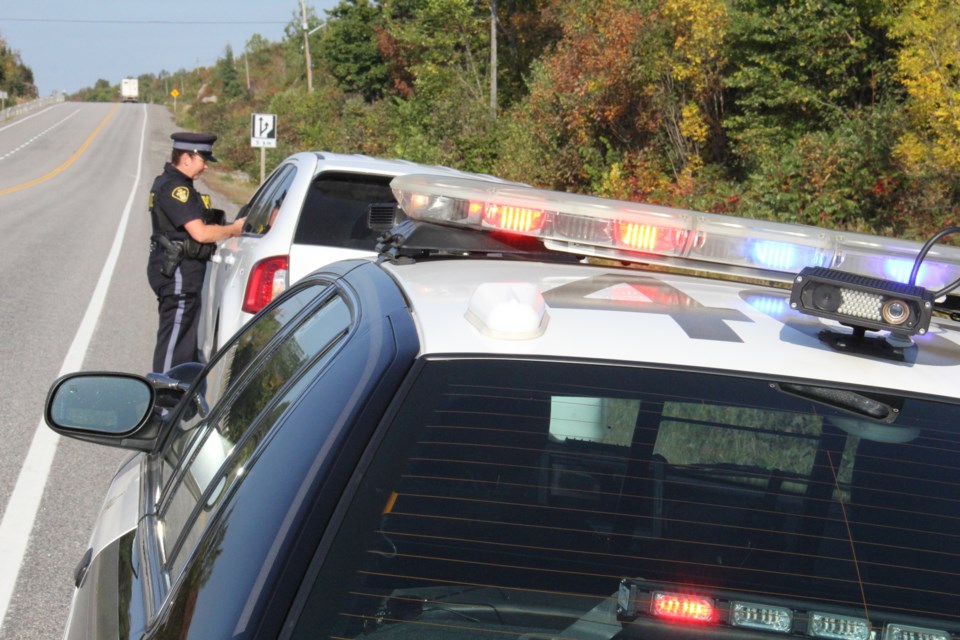Any cop will tell you that policing has changed drastically over the years, and technology that allows police cars to scan your license plate --- as you drive the highway, day or night --- has created a whole new ball game.
Introduced a couple of years ago, the on-board cameras are now being used extensively by the OPP in northeastern Ontario.
Able to scan two license plates per second, the camera instantly sends plate information to an onboard computer, which then emits a tone indicating a scan has taken place.
If the scan is a "hit" the computer alerts the officer to the type of offense, and whether it's a high priority --- stolen vehicle or suspended license --- or run of the mill expired plate sticker.
BayToday hitched a ride this week with OPP Const. Jeannine Grassie, a 24 year veteran, to see how effective the system is. Our target, a stretch of Highway 17 west just outside the city limits.
The shift begins with the daily uploading of a Ministry of Transportation "hotlist" of plates. This day it tops 8,000,000.
We pull off the road and wait. Almost immediately we get our first "hit".
It's a woman driving a car with an expired tag.
Const. Grassie double checks the computer against the photo scan to ensure a match and pulls out to follow, then on go the lights. The vehicle pulls over.
At the same time the computer alerts to another hit --- another expired tag --- but luck is on his side as Grassie prepares to speak to the first driver.
"We'll get him another day," she smiles.
While the officer checks the paperwork I chat with the driver. She's a grandmother taking her grandson to court in Sturgeon Falls and she's borrowed her daughter's car to do it. She has no idea the plate has just expired.
So she gets a warning to have her daughter update the tags that day, and Const. Grassie makes a note of it in the computer so the next officer will have the information."It's an extra tool in our tool box in order to get those people that have outstanding plates that aren't paying the fees that we have to pay on a yearly basis. When our birthday comes along, we have to renew our plates. If we don't pay our fines our license is suspended and we're not supposed to drive."
Our second hit is another woman with an expired tag, but this time, the car owner.
The sticker says September and it expired five days ago. She thought she had till the end of the month to renew.
"Not so", Grassie tells her, and issues another warning to get a new sticker that day.
The computer knows the birth date of drivers when it scans their plates --- the sticker expires on your birthday.
We go through six false alarms, all caught by Grassie double checking before making a decision to pull a vehicle over.
But then, the computer makes a hit and barks out that it's a priority...and not a false alarm.
It turns out the owner of the Dodge pickup bought it a year ago but never bothered to register it. In addition, the plates are not authorized for the vehicle and in fact are different front and back.
To top it off the driver has no insurance.
"Without this technology we would never, ever been alerted to this," Grassie tells me after talking to the male driver.
While she checks the paperwork I ask the driver what he thinks of the scanner.
"It's a good idea," he admits while explaining that he took the plates off another vehicle he owns that had a flat tire.
He's got a transmission in the truck that he's getting repaired so he can sell a car to help pay his daughter's tuition to attend Nipissing University.
But he blames himself, not the officer.
"She's treated me awesome," he says of Grassie. "Very fair and polite."
His expression changes, and he turns white when told by the officer that the fine for no insurance can be $5,000, and that the unregistered vehicle and unauthorized plates charges both have fines up to $500.
But while Grassie seizes the plates, she allows him to arrange for a flatbed to pick up his truck, instead of incurring a very expensive towing charge.
He thanks her and shakes her hand.
We're looking for suspended drivers. Grassie says that's a priority.
"Suspended drivers are not covered under insurance, and you have no avenue if you are involved in a collision with one of those drivers. Those are the people we are targeting and this technology makes it that much easier.
"A person driving down the road may not necessarily alert me that there's a problem with that plate, or the status of the driver. With this technology it takes a picture and tells a story about whether the person is suspended or if the plates are expired or stolen."
But while the technology is ruthless in its efficiency, it still requires common sense from the officer. The computer will tell if the suspended driver is male or female. Grassie does a visual check every time.
"I do that because we all have the right to not be arbitrarily stopped for no reason. I want to make sure that if I get a hit for a suspended driver, and it comes back as a male, there is a male in the driver's seat. If it's a female I have no reason to stop that vehicle.
A lot of people still don't know this technology exists, and Grassie always explains it when she does a stop.
"There are a lot of people who are surprised, but once they realize why you stopped them, then they understand."



